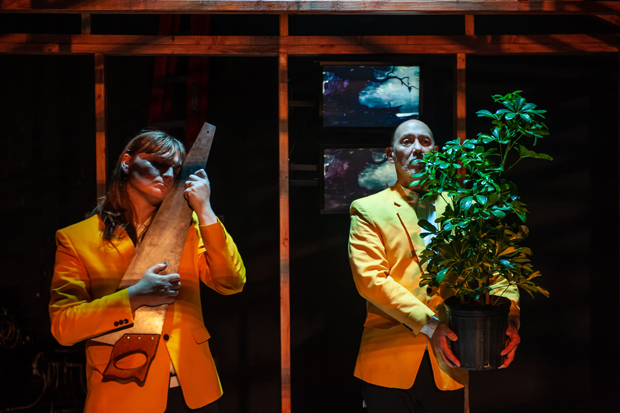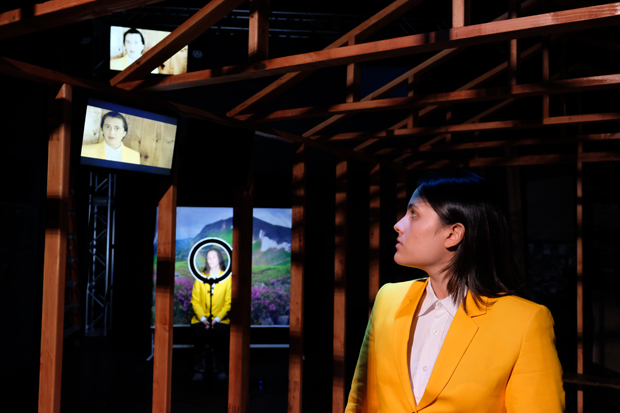Theater Mitu Considers Whether a House Is Indeed a Home
A multimedia riff on Anton Chekhov’s ”The Cherry Orchard” makes its world premiere in Gowanus, Brooklyn.

(© Theater Mitu)
According to a program note by director Rubén Polendo, House or How to Lose an Orchard in 90 Minutes or Less is inspired by "this moment of mass migration and displacement." However, this multidisciplinary work from experimental theater company Theater Mitu doesn't lean too hard on topicality. Instead, the piece plays like a tone poem about the broader concept of "home" — namely, the human desire for a place to settle down, and all the personal and historical implications surrounding that desire.
Anton Chekhov famously explored that desire in his play The Cherry Orchard, which revolved around the ultimately futile attempts by members of an aristocratic Russian family to save their precious, long-held estate. The creators of House have used that text as a springboard for this exploration of home. There are lengthy stretches in which many of the actors perform scenes directly from or inspired by the Chekhov play, and, like The Cherry Orchard, the piece itself is structured in four acts. As with many other Theater Mitu productions, such bits of conventional drama are then blended with original songs (most of them written by Ada Westfall, with lyrics made up of lines from the play), video (archival and original), and monologues adapted from interviews conducted by the creators.

(© Theater Mitu)
It's in some of those interview-derived monologues that House brings The Cherry Orchard into our current moment. Justin Nestor delivers one monologue that refers directly to the kinds of loans that led to the 2007-10 subprime mortgage crisis, suggesting a modern-day equivalent to the class commentary in Chekhov's play. In another monologue, Isabella Uzcátegui alludes to the ongoing immigration debate in the US by articulating the mindset of an immigrant struggling to deal with feelings of rootlessness while trying to adapt to a new place and culture.
All of these elements are presented in a heady multimedia mosaic that can initially overwhelm the senses. Thankfully, House feels less overstuffed than Theater Mitu's last piece, Remnant, which buried an insightful look at wartime PTSD under one too many technological layers. Grounding House in The Cherry Orchard gives it a solid foundation for its wilder bits of formal experimentation. A feeling of melancholy consistently peeks through — a longing for stability that vibrates throughout the work in Westfall's wistful songs, Alex Hawthorn's droning sound design, and an elaborate set that features a whole house without walls and only the wooden frames visible as its centerpiece (Hawthorn, Nestor, Polendo, and Scott Spahr are credited as lead architectural installers).
The production's biggest disappointment is the glaring absence of Polendo's promised incorporation of Nobuhiko Obayashi's 1977 horror film House. There's barely any evidence of that great cult classic in the finished work beyond a pastoral backdrop inspired by a similar image in the film, and a sample from the film's soundtrack in Westfall's closing song, "Life Here Has Ended." Similar to The Cherry Orchard, Obayashi's wackily trippy film is also partly about a young girl's lingering grief over her late mother's death, with the whole film functioning as her cathartic and destructive journey toward a sense of normalcy. It's a shame the creators couldn't work Obayashi's film more directly into the piece, but that's hardly enough to detract from an otherwise thought-provoking and viscerally evocative whole.

(© Theater Mitu)









